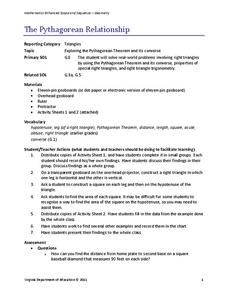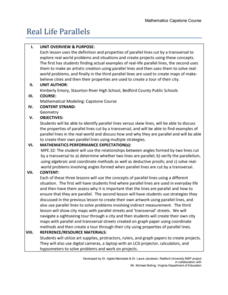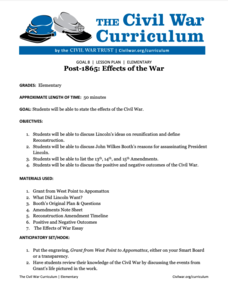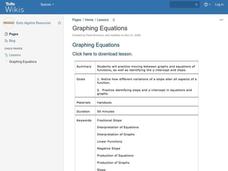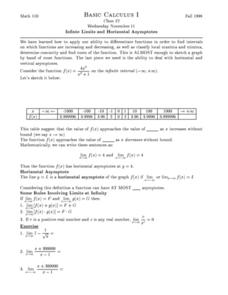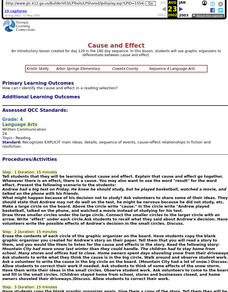Virginia Department of Education
Laboratory Safety and Skills
Avoiding lab safety rules will not give you super powers. The lesson opens with a demonstration of not following safety rules. Then, young chemists practice their lab safety while finding the mass of each item in a mixture and trying to...
Virginia Department of Education
Succession
The final instructional activity in a two-part series prompts scholars to create newspaper articles and succession events. Applying their knowledge of the ecosystem and the past examples of succession, they predict what will happen...
Virginia Department of Education
The Pythagorean Relationship
Add up areas of squares to discover the pythagorean relationship. Small groups create right triangles with squares along each side. They calculate the areas of each square and notice the relationship. Groups construct other types of...
Wells Fargo
Wells Fargo History Museum: Curriculum Guide
Learn about the California Gold Rush from an institution that has been in place since the early days of the American West: Wells Fargo History Museum. From domain-specific vocabulary review to group research projects, an expansive packet...
Heritage Foundation
The Powers of the Executive
Are executives as powerful as they sound? High schoolers find out about the US president and executive branch. A variety of activities include scaffolded reading sections, research assignments, and collaborative group work.
University of Pennsylvania
Decoding Propaganda: J’Accuse…! vs. J’Accuse…!
Reading snail mail is a great way to go back into history and to understand others' points of view. The resource, the second in a five-part unit, covers the Dreyfus Affair. Scholars, working in two different groups, read one letter and...
EngageNY
Grade 11 ELA Module 2: Unit 1, Lesson 12
Readers closely examine paragraph nine in Du Bois's "Of Our Spiritual Strivings" to understand prejudice's meaning and research Jim Crow laws.
EngageNY
End of Unit 1 Assessment: Analyzing an Interview with a Rainforest Scientist Part 2 and Comparing and Contrasting Texts About Rainforest Biodiversity
The end is in sight. Pupils complete an end of unit assessment, analyzing an interview with a rainforest scientist and then comparing and contrasting two informational texts. Next, they complete a self-assessment to reflect on their...
National Endowment for the Humanities
The New Order for "Greater East Asia"
Sometimes the New Order becomes synonymous with its implications for European countries, but what about its consequences for East Asia? The final instructional activity in a four-part series teaches scholars about World War II. High...
5280 Math
Stories That Formulas Tell
Learn the stories a formula holds. An interesting lesson takes a unique approach to teach how to use formulas. Beginning with a formula, learners predict what the variables stand for and then use the formula to make calculations and tell...
K12 Reader
Alphabet Collection: Adverbs
Finish the assignment happily, quickly, and thoroughly! A one-page worksheet challenges young grammarians to list adverbs in alphabetical order.
Radford University
Real Life Parallels
There's no parallel to a great resource. Scholars take part in three lessons in which they investigate parallel lines in real-world situations. They search for and take pictures of parallel lines in and around the school, develop artwork...
American Battlefield Trust
Post-1865: Effects of the War
What did Lincoln want? Historians still debate this question, and perhaps people will never fully know. Class members examine the legacies of the war, including the Thirteenth, Fourteenth, and Fifteenth Amendments. The lesson plan also...
Curated OER
Dialogue Tags/ Synonyms for Said
Sixth graders analyze dialogue tags. In this synonyms lesson students work in groups analyzing a personal narrative. They enter the words onto a classroom chart as well as their notes or journal. The students replace tags with more...
Curated OER
"D-D-D-Dribble Your Basketball Down the Court!"
Students examine the d=/d/ correspondence in order to differentiate it from the letter "b." They pretend to dribble a basketball while making the /d/ sound before reciting a tongue twister and writing the letter on primary paper. Next...
Curated OER
Candy Experiment
Students investigate why a slope is negative. In this algebra lesson, students differentiate between negative and positive slopes by graphing. They collect data, write an equation and graph using the slope.
Curated OER
Graphing Equations
Students differentiate between linear and quadratic functions. In this algebra lesson, students write equations of graphs and graph a function from an equation. They also identify the slope and y-intercept.
Curated OER
Soil Sample Lab
Pupils test the pH of soil samples they collected from the field trip. In this chemistry lesson, students differentiate acids and bases. They write a lab report about the experiment.
Curated OER
Optional Power Series Problems
In this power series worksheet, students use substitution, polynomial multiplication, polynomial division, differentiation, and integration to find numbers in a series. They write each Maclaurin series as a simple function. This one-page...
Curated OER
Challenge Discussion Sheet 3
In this function worksheet, students prove given limits, solve differentiate functions, identify points on a graph with tangent lines passing through given points, determine the radius of a largest sphere that can fit inside of a pyramid...
Curated OER
Infinite Limits and Horizontal Asymptotes
In this infinite limit learning exercise, students compute horizontal and vertical asymptotes. They use trigonometric functions to find the limits of functions and compare results. This two-page learning exercise contains examples and...
Curated OER
Graphs of Functions
In this function worksheet, students sketch graphs of functions, write functions as a composition of two or three functions, and differentiate functions. This three-page worksheet contains approximately 33 problems.
Curated OER
Kindergarten Phonics
Students are introduced to the letters and phonemes for C, L, N, P, T, and A. They identify each letter in its upper and lowercase forms. Students differentiate the letters from each other and practice identifying objects and pictures...
Curated OER
Cause and Effect
Fourth graders use graphic organizers to differentiate between cause and effect. They read a story independently and write the cause and effects in the graphic organizer.


